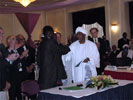
While rumors continue to fly in the Hague and in New York regarding the expected indictment of Sudanese President Omar al-Bashir, talks between Darfur’s JEM rebels and the Sudanese government continue in Doha, Qatar.
After the first day of talks on Tuesday (which, it is important to note, are not “Darfur peace talks,” but are better described as “talks about talks”), the JEM representative, Djibril Ibrahim, underlined the rebel group’s goal of “adopting confidence-building measures” before “address[ing] the key bones of contention.” For his part, Nafie Alie Nafie, President Bashir’s close adviser and the head of the Sudanese government delegation said that the talks “renewed Sudan’s determination to continue down the path of peace.”
But on Thursday, the day after the news broke about the likely arrest warrant issuance by the ICC, things heated up a bit in Doha. Following a meeting with the Qatari Emir, Nafie Ali Nafie again expressed his optimism about the possibility of an agreement with the JEM, but played down reports about the ICC arrest warrant and accused the Court of trying to hinder diplomatic efforts to solve the Darfur crisis. After his own private meeting with the Emir, the JEM’s leader, Khalil Ibrahim, repeated his rebel group’s standing offer to arrest Bashir and hand him over to the Court if the arrest warrant is indeed issued, and asserted that the ICC’s expected move would not hinder peace efforts.
Finally, Djibril Bassolé, the joint United Nations-African Union mediator for the Darfur crisis, called for an immediate cessation of hostilities in Darfur, stating:
I think if the Doha meeting could provide cessation of hostility in Darfur, or at least suspension of hostility, then we could move forward to solve the problem.
Bassolé could not be more right. The week before the Doha talks began, the Sudanese military’s aerial attacks on the South Darfur town of Muhajiriya caused tens of thousands of civilians to flee their homes. And yesterday, the U.N. reported that Sudanese authorities have prevented humanitarian organizations from getting food and water to more than 100,000 people to three areas in South Darfur. Maybe I’m biased, but it’s hard to believe President Bashir’s closest advisor, Nafie Ali Nafie, when he says that Khartoum is committed to peace.
Meanwhile, several other Darfuri rebel factions have criticized the talks. This criticism highlights the crucial need for buy-in from all of Darfur’s rebel groups—in addition to key civil society actors and women’s groups—in any legitimate process attempting to build toward a sustainable peace in Darfur.
On a related note, I’m pleased to note that Politico recently featured a thoughtful piece by Refugees International Vice-chair Eileen Shields-West on the Obama administration’s “opportunity to get it right” in Sudan at a crucial moment, not only in Darfur, but also for the country’s future (stay tuned for a strategy paper on this important topic soon).
(N.B.: The photo is a flashback, from the failed 2006 Darfur Peace Agreement negotiations in Abuja, Nigeria. Again: failed. Not a good example of an inclusive, effective, or sustainable peace process).

